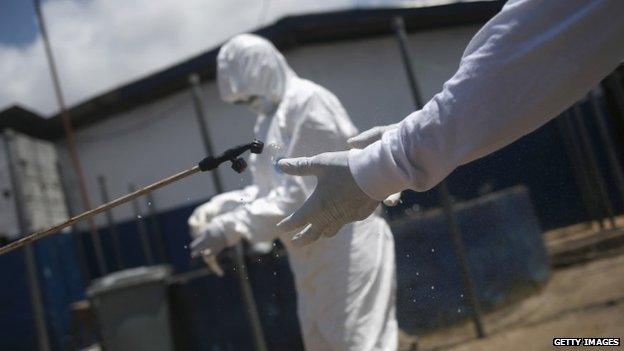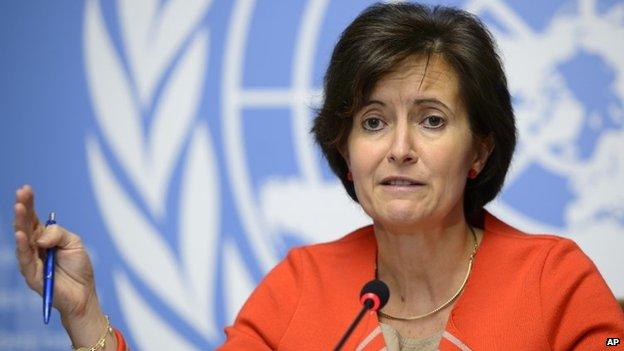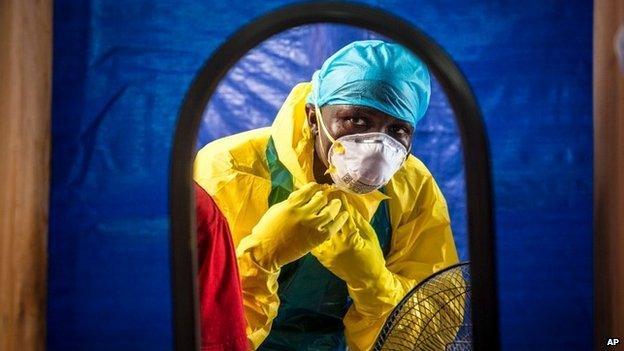Ebola crisis: WHO accused of 'failure' in early response
- Published

The WHO is accused of underestimating the impact of Ebola
Poor communication and incompetent staff meant the World Health Organization failed to react swiftly Ebola outbreak in Africa, reports say.
An internal document said those involved "failed to see some fairly plain writing on the wall", according to the Associated Press, external.
Separately, sources close to the WHO told Bloomberg of multiple failures in the outbreak's early stages.
In response, a senior official told the BBC time would come for an inquiry.
In the worst affected countries - Liberia, Guinea and Sierra Leone - the Ebola virus has now killed 4,546 people with cases of infection numbering 9,191, according to the latest WHO figures.
'Perfect storm'
The reports have brought into focus the way the WHO dealt with the outbreak in the months after it received the first reports of Ebola cases in Guinea in March.
Medical charity Medecins Sans Frontieres (MSF) warned in April that the outbreak was out of control - something disputed by the WHO at the time.
Sierra Leone boy: "I've lost five members of my family"
"Nearly everyone involved in the outbreak response failed to see some fairly plain writing on the wall," the document obtained by AP says.
The draft report - a timeline of the outbreak - also reportedly says that experts should have realised that traditional methods of containing infectious disease would not work in a region with porous borders and poor health systems.
Among the problems cited in the information obtained by AP and Bloomberg are:
A failure of WHO experts in the field to send reports to WHO headquarters in Geneva
Bureaucratic hurdles preventing $500,000 reaching the response effort in Guinea
Doctors unable to gain access because visas had not been obtained
'Focus'
Responding to the allegations, the WHO's head of global response and alert, Isabelle Nuttall, told the BBC: "Time will come for investigation. Right now we have to focus on the response."

"By June it became something different", says Dr Nuttall
On the alleged failure of the WHO to react quickly enough, she said the disease had, up till then, not been common in West Africa, only in Central Africa.
"When we scaled up, the beginning of the outbreak was very comparable to what we had seen elsewhere in Africa," she said. "And then, by June, it became something different.
"We indicated that this outbreak was different. I'm afraid we probably didn't say it loud enough for the world to understand what we were saying and for all the international community to be mobilised."
Earlier, WHO Director General Margaret Chan told Bloomberg, external that she was "not fully informed of the evolution of the outbreak" and the response might not have matched the "scale" and "complexity" of the spread.


The World Health Organization is ramping up efforts to stop Ebola from spreading elsewhere in Africa
Analysis: Imogen Foulkes, BBC News, Geneva
The combination of a leaked internal document and frank comments from the WHO's director general signal growing concerns about the effectiveness of the agency's efforts against Ebola.
Back in April, MSF described the outbreak in West Africa as unprecedented, warning that it risked spiralling out of control.
The WHO responded that it had seen only sporadic cases in a limited geographic area. It was not until August that the organisation suggested international reaction to Ebola may have been too slow.
Perhaps WHO officials feared accusations of overreacting: in 2009 the organisation swiftly declared a global pandemic of swine flu, advising countries to spend billions on treatments and vaccines against a virus which caused far fewer deaths than regular seasonal flu.
There are allegations too that the WHO's regional office in Africa may be part of the problem, that its staff failed to properly monitor West Africa's Ebola outbreak. We now know it began in December, but the first cases were not notified until March.

'Ridiculous'
Earlier, MSF said international pledges of deployments and aid for Africa's Ebola-hit regions had not yet had any impact on the epidemic.
MSF's Christopher Stokes said the disease was still out of control.
Christopher Stokes, General Director, MSF: "[The crisis] has never been under control"
He said it was "ridiculous" that volunteers working for his charity were bearing the brunt of care in the worst-affected countries.
Mr Stokes, who leads MSF's Ebola response, said international efforts would not have any effect for another month and a half.
UN Ebola co-ordinator David Nabarro: "We are putting in place the foundations of a very powerful response ... by the end of December we will start to see the outbreak curve coming down"
MSF runs about 700 out of the 1,000 beds available in treatment facilities Liberia, Sierra Leone and Guinea.
The BBC's Mark Doyle, at the UN Ebola logistics base in Ghana, says it is generally agreed that at least three times that number are needed.
Responding to MSF's criticisms, David Nabarro, the UN system co-ordinator for Ebola, told the BBC that he had seen a big increase in the international response over the past two months.
"I am absolutely certain that when we look at the history, that this effort that has been put in place will have been shown to have had an impact, though I will accept that we probably won't see a reduction in the outbreak curve until the end of the year."
In other developments:
The WHO has announced that Senegal is now officially free of Ebola, as it has gone 42 days without any sign of the virus.
President Obama named Ron Klain - former chief of staff to Vice President Joe Biden - as Ebola "tsar" in charge of combating the virus in the US
Five East African countries - Kenya, Uganda, Tanzania, Rwanda and Burundi - are to send 600 personnel to help in the worst affected nations

Avoid direct contact with sick patients as the virus is spread through contaminated body fluids
Wear goggles to protect eyes
Clothing and clinical waste should be incinerated and any medical equipment that needs to be kept should be decontaminated
People who recover from Ebola should abstain from sex or use condoms for three months

-
Protective Ebola suit
× -
Surgical cap
×The cap forms part of a protective hood covering the head and neck. It offers medical workers an added layer of protection, ensuring that they cannot touch any part of their face whilst in the treatment centre.
-
Goggles
×Goggles, or eye visors, are used to provide cover to the eyes, protecting them from splashes. The goggles are sprayed with an anti-fogging solution before being worn. On October 21, the US Centers for Disease Control and Prevention (CDC) announced stringent new guidelines for healthcare personnel who may be dealing with Ebola patients. In the new guidelines, health workers are advised to use a single use disposable full face shield as goggles may not provide complete skin coverage.
-
Medical mask
×Covers the mouth to protect from sprays of blood or body fluids from patients. When wearing a respirator, the medical worker must tear this outer mask to allow the respirator through.
-
Respirator
×A respirator is worn to protect the wearer from a patient's coughs. According to guidelines from the medical charity Medecins Sans Frontieres (MSF), the respirator should be put on second, right after donning the overalls.
-
Medical Scrubs
×A surgical scrub suit, durable hospital clothing that absorbs liquid and is easily cleaned, is worn as a baselayer underneath the overalls. It is normally tucked into rubber boots to ensure no skin is exposed.
-
Overalls
×The overalls are placed on top of the scrubs. These suits are similar to hazardous material (hazmat) suits worn in toxic environments. The team member supervising the process should check that the equipment is not damaged.
-
Double gloves
×A minimum two sets of gloves are required, covering the suit cuff. When putting on the gloves, care must be taken to ensure that no skin is exposed and that they are worn in such a way that any fluid on the sleeve will run off the suit and glove. Medical workers must change gloves between patients, performing thorough hand hygiene before donning a new pair. Heavy duty gloves are used whenever workers need to handle infectious waste.
-
Apron
×A waterproof apron is placed on top of the overalls as a final layer of protective clothing.
-
Boots
×Ebola health workers typically wear rubber boots, with the scrubs tucked into the footwear. If boots are unavailable, workers must wear closed, puncture and fluid-resistant shoes.
